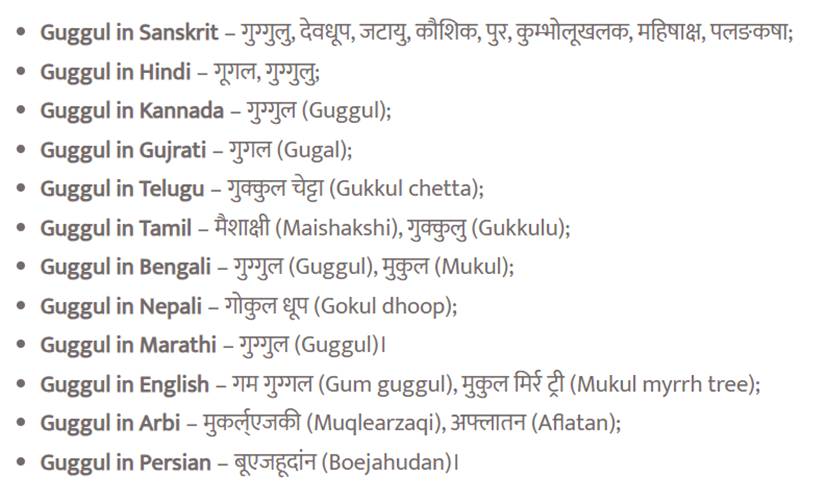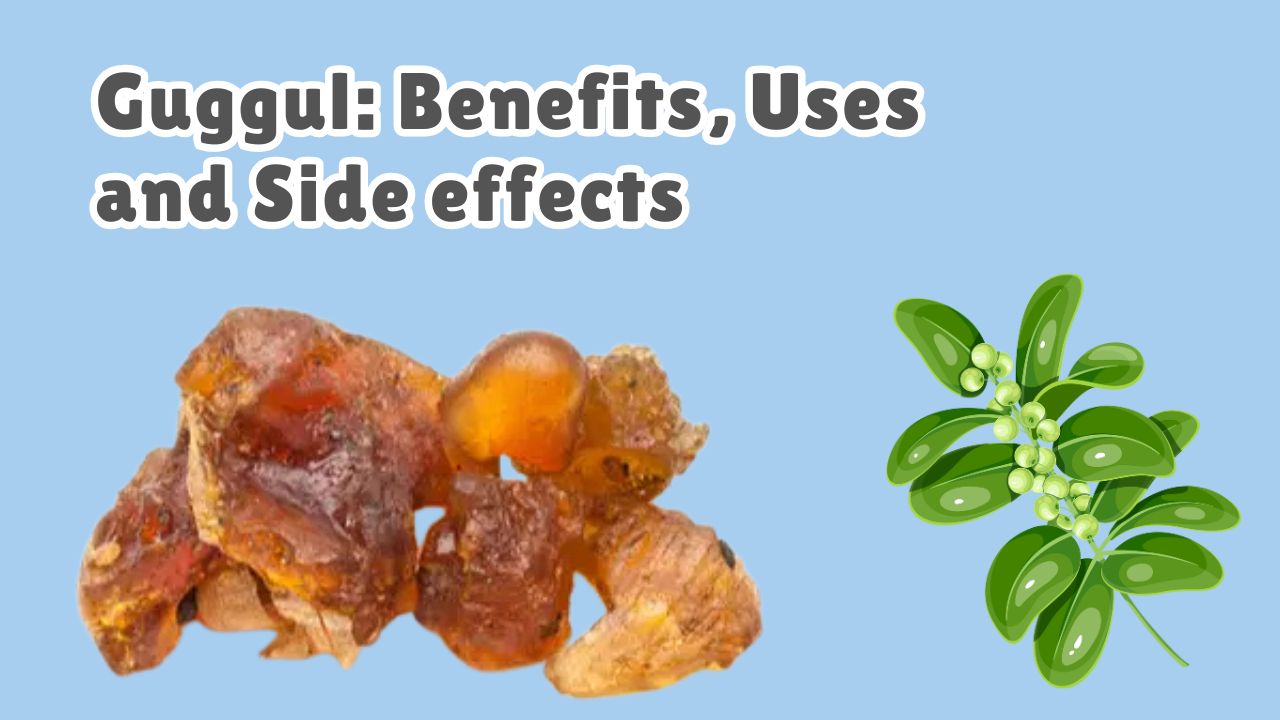What is Guggul? (guggul kya hota hai)
Guggul is a gum kind of resin based medicinal stuff, and guggul’s biological source from where it is obtained is a tree called Mukul Myrrh which belongs to the Burseraceae family. The Botanical name for Guggul is Commiphora mukul. It is also called as Indian bdellium. It has got vast usage and applications in Ayurvedic medicine and Health care. It is obtained in form of a sticky sap which is nearly yellow to brown in colour, and has a very unique smell.
In Ayurveda, guggul has been known for many ages because of its amazing health benefits. It helps in treating many diseases and health conditions like – Arthritis/Joint pains, Skin Disorders, Diabetes control, Constipation, Gout/Uric Acid, High Cholesterol and Respiratory disorders like Asthma. Guggul for pooja, is also one exclusive application where it is known to improve the concentration and focus. Guggul dhoop is used during spiritual activities.
The main active compound responsible for its health benefits is called as guggulsterones. These compounds have the ability to reduce inflammation, lipid metabolism, and improved immune function.
Guggul flower
Guggul flowers are small and five-petaled, mostly reddish pink, and bloom in clusters. They also have a nice smell. The plant produces a resinous substance that is also called guggul, from which several medicines are made. Guggul resin is a major part of Ayurvedic practices since ancient times for ailments related to overweight, control of cholesterol, and inflammatory diseases.
Guggul: Where do they found in India
Guggul is native to dry parts of India and is found in north western states like Gujarat, Rajasthan and Karnataka where it flourishes in sandy/rocky soils. Its flowering time is between November and July and this is immediately followed by fruiting. The ripe fruit is small, red which can be propagated for its seeds.
Guggul also as known as, in different languages:
In different regions of India guggul is called by different names as shown in the picture below:

This table provides the various names of Guggul in different languages which demonstrates its cultural relevance in traditional medicine.
| Language | Name of Guggul |
|---|---|
| Guggul in English | Guggul, Indian Bdellium |
| Guggul in Hindi | गुग्गुल (Guggul) |
| Guggul in Sanskrit | गुग्गुलु (Guggulu) |
| Guggul in Tamil | குக்குலு (Gukkulu) |
| Guggul in Telugu | గగ్గిపన్ను (Guggipannu) |
| Guggul in Kannada | ಗುಗ್ಗುಲು (Guggulu) |
| Guggul in Gujarati | ગુગલ (Gugal) |
| Guggul in Marathi | गुग्गल (Guggala) |
| Guggul in Bengali | গুগ্গুলু (Guggulu) |
| Guggul in Malayalam | ഗുള്ഗുളു (Gulgulu) |
Synonyms for guggul
Pura, Commiphora wightii, Kausika, Gulgulu, Palankasa, Guggula, Gum-gugul, Indian Bdellium, Gugal, Guggal, Gugar, Kanthagana, Guggala, Mahishaksha guggulu, Guggulu, Guggal Dhoop, Guggulugida, Kanth Gan, Mahisaksi Guggalu, Makishakshi guggulu, Mahishaksh, Muqil (Shihappu), Guggipannu.
Active compounds present in Guggul
Guggul, which comes from the resin of the plant Commiphora wightii has different phyto-chemical constituents which pint towards its focus on medicinal properties. Here are the biological active compounds in guggul.
- Guggulsterones (E and Z): These are the most known compounds for their cholesterol-lowering and anti-inflammatory properties which makes them belong to the class of hypolipidemic compounds. In addition, they also bind with some receptors specefic to cholesterol metabolism.
- Diterpenoids: This group includes cembrene and myrrhanol which arer thought to have anti-inflammatory and anti-oxidant activity.
- Triterpenoids: This class comprises myrrhanone and guggulsterol, both of which have great therapeutic targets and help to further the idea behind guggul’s.
- Flavonoids: Other functional flavonoids are quercetin which is known to posses anti-inflammatory and antioxidant properties.
- Amino Acids: Guggul has a variety of amino acids such as cysteine, histidine, and lysine that are crucial for one’s health, among others.
- Volatile Oils: The resin contains limonene, eugenol, alpha pinene and other essential oils that may enhance the overall well-being of the user.
- Steroids: Apart from guggulsterones, other steroid compounds are present that might account for its pharmacological actions.
- Aliphatic Compounds: Long chain aliphatic tetrols and esters are also components of gugguls complex chemical structure.
- Lignans: These antioxidents heavy compounds can be effective in promoting the health benefits of gulgul overall health.
- Carbohydrates: Guggul has other sugars as well which may contribute to its nutritional and medicinal worth.
These substances are believed to work in an integrative fashion to confer to guggul its multiple therapeutic activities such as its anti-inflammation, antioxidant and lipid lowering properties.
Properties and Uses of Guggul
1. Lowers Cholesterol Levels:
Guggul is known for centuries for its benefits like cholesterol-lowering properties, particularly in reducing LDL (low-density lipoprotein) cholesterol levels, also known as “bad” cholesterol. Guggul helps to regulate the inhibit the synthesis of cholesterol in the liver and inhibits any excess synthesis, which helps in maintaining the LDL levels. Additionally, it promotes the conversion of excess cholesterol into bile acids, which are then excreted out from the body.
2. Anti-inflammatory Properties:
Guggul is well-recognized for its anti-inflammatory properties. The active compounds in guggul called as guggulsterones, produces anti-inflammatory effects by inhibiting the activity of pro-inflammatory enzymes and cytokines in the body. This helps in reducing inflammation, swelling and pain associated with health disorders like arthritis, rheumatism, and inflammatory skin disorders.
3. Improves Thyroid Function:
Guggul is also known for enhancing thyroid function in our body. This in returns maintains the hormonal balance in the body along with regulating metabolism and energy production. The active compounds (guggulsterones), stimulates the thyroid gland which increases the production of thyroid hormones. This is very useful for individuals who are suffering from hypothyroidism, where the thyroid hormone levels falls below the required levels.
4. Detoxifying Properties:
Guggul helps in elimination of toxins from our body through its laxative properties. And hence it also helps in Constipation. It helps in regular excretion of waste products and toxins from the body, and helps in building healthy digestive system.
Benefits of Guggul (guggul ke fayde)
- Cholesterol Optimization: Guggul is effective in reducing LDL cholesterol and triglycerides as well as raising the levels of HDL cholesterol.
- Inhibition of Inflammation: Guggulsterone is a potent anti-inflammatory compound that is useful in reducing swelling and painful sensations especially in arthritis patients.
- Aid in Weight Loss: It is thought to have an effect on metabolism and to promote weight loss in conjunction with proper diet and physical activity.
- Integrated Treatment of the Skin: Guggul in traditional medicine is used for the treatment of skin disorders like acne, psoriasis, and eczema on account of its skin healing efficacy.
- Treatment of the Liver: Guggul has the ability to assist in the detox of the liver and therefore improve its function, which can be useful to a person with fatty liver disease.
- Management of Thyroid Hormones: A few studies revealed that guggul has the ability to activate and stimulate the functioning of the thyroid glands which may be useful for individuals with hypothyroidism.
- Removal of Reactive Oxygen Species: Guggul has some antioxidant enzymes which are good in reducing oxidative stress and prevent damaging of cells.
- Blood Sugar Maintenance: An investigation has shown that guggul could help in the maintenance of blood sugar which is very useful to diabetic patients.
- Support of Joint Pain: In addition, the anti-inflammation properties of this substance can also maintain the health of the joints and relieve pain and stiffness.
- Heart Health: Cholesterol levels might be improved and inflammation reduced by guggul, thereby potentially aiding overall heart health.
How to Consume Guggul: Method of Usage
- Tablets: It is recommended to take 1-2 guggul tablets each day and wash it down with warm water, preferably before meals.
- Powder Form: Apply this mixture of guggul powder and warm water directly on the affected skin: blend in a quarter to one half teaspoon of guggul powder and some warm water or honey.
- Capsules: These are also easily available at health stores if one prefers them. Just follow the dosage directions on the label.
- Tea Infusion: Guggul powder can be consumed otherwise by using it to brew guggul powder in warm water for tea. This tea can be consumed once or twice a day.
- With Honey: Consuming guggul powder with honey is another method which can also be done on a daily basis.
- As part of a supplement blend: It is known that guggul can also be combined with other herbs focused on weight loss or cholesterol management which could be useful.
- Topical Ointment: Products containing guggul extract are also available which are topical ointments. These should be followed as per the instructions provided.
- In Cooking: A few other ways of incorporating guggul into one’s body is by adding a tablespoon or more into smoothies or healthy drinks.
- Make It a Habit: For best effects, make guggul one of your daily supplements.
- Consult Physician Before Starting: It is advisable to seek recommendations from a physician before starting with any kind of supplement.
Possible Side-effects of Guggul
- GI Disturbances: Most of these side effects are gastrointestinal like stomach upset, nausea or diarrhea and gas; a small dose can be effective to start with for purposes of tolerance assessment.
- Dermatological Effects: Sensitive or allergic individuals are advised to discontinue use if this leads to cutaneous allergic reactions such as rashes or rashes or itches.
- Hepatic Damage: Prolonged use has an adverse effect on the liver; it should be avoided in people who already have liver problems without a doctor’s advice.
- Altered Cycles Of Menstruation: Due to guggul use, a few women report this affecting their menstrual cycle; these women should keep track of any such developments.
- Drug Interaction: Blood thinners such as warfarin and thyroid medications can react with guggul; patients undergoing treatment for these conditions should seek doctor consultation.
- Migraine, Dizziness Or Both: Such eventually related side effects may include headaches or feeling of dizziness; when such occasions arise, a lower dose or the stop of use is warranted.
- Hypoglycemia Risk: For diabetics, guggul may be problematic as it may reduce blood sugar levels too much when used in a regimen containing diabetes medications; follow up is vital.
- Thyroid Dysfunction Risk: Excess dosage could cause symptoms resembling hyperthyroidism; individuals who have problems with their thyroid gland ought to see a medical specialist.
- Pregnancy and Breastfeeding Concerns: Guggul should not be administered in pregnancy or lactation since safety data is not adequate; do not take advice without medical recommendation.
- Not Suitable for Everyone: Guggul is not advisable to people suffering from any hormonal related diseases like hormone sensitive cancers unless instructed to do so by a medical professional.
Must Read,
✔️ Is Gripe water Safe for Newborns: Side effects of Gripe water
✔️ Kirana Store Item List | General Store Item List (Grocery or Provision Store Item List)









